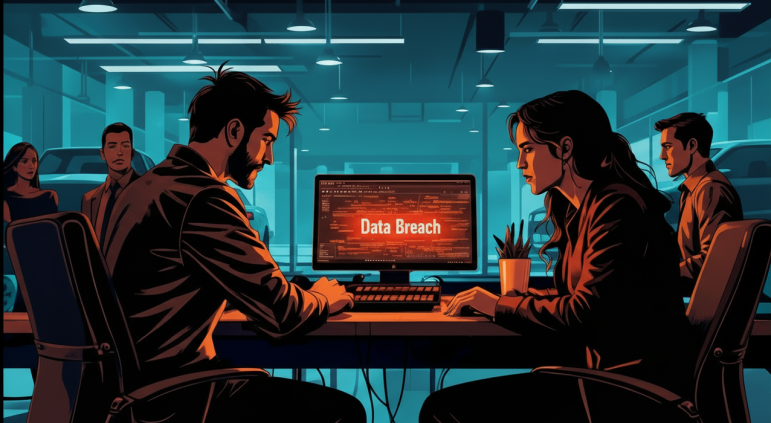Why the June 2024 outage put dealer group executives on the front lines of cybersecurity — and how to lock down every rooftop.
Dealership groups are still counting the cost of the June 2024 cyberattack on CDK Global, while cybercriminals are studying what worked. The incident crippled core dealership systems for nearly 15,000 rooftops. It costs dealers $1.02 billion in losses, including $56,200 in new vehicle sales1, plus service revenue, staffing costs and ongoing legal expenses.
For dealer group executives, this wasn’t just another vendor problem. It was a live-fire demonstration of tactical vulnerabilities proving that your cybersecurity strategy needs fundamental changes – starting with recognizing that vendor breaches are your breaches under current regulations.
Why This Demands Executive Action Today
The CDK incident proved that cybersecurity is no longer an IT department issue, it’s a business continuity issue that requires executive leadership. When threat actors can shut down thousands of rooftops through a single vendor compromise, traditional security approaches fail. Dealer groups need enterprise-wide security strategies that treat every location as part of one interconnected target.
Three Hard Lessons from CDK
The CDK incident taught every dealer group three critical lessons:
- Your supply chain can take you down – Vendor dependency creates single points of failure. When your DMS goes down, vehicle sales, service operations, and financing stop immediately. Most groups depend on 7-15 mission-critical vendors with access to customer data. Your group is one target.
- Supply chain attacks scale rapidly – Compromising one vendor can disrupt thousands of dealers simultaneously. The CDK attack proved this model works—and other threat actors are replicating it.
- You can’t fix what you can’t see – Without around-the-clock monitoring and dark web scanning, you’ll learn about breaches from customers, regulators, or news reports, not your security systems.
The 30-Day FTC Reality
Under FTC rules effective since May 2024, you must notify regulators within 30 days of discovering a breach affecting 500+ consumers. The clock starts when you discover the breach—not when your vendor tells you about it. Miss that deadline, and you face up to $53,088 per violation, plus lasting damage to customer trust. And remember, your vendor’s breach is your breach.
The Real Cost of Waiting
The CDK disruption cost individual dealers an average of $68,000 in direct losses, but the operational impact lasted months. Customer trust, staff productivity, and vendor relationships all took hits that some groups are still repairing.
More concerning: high-profile breaches typically trigger copycat attacks. When criminals see a method that can generate billion-dollar industry losses, they replicate it. Dealership networks remain prime targets because of the valuable customer financial data they process daily.
What Dealer Group Executives Must Do
Most post-mortems stop at what happened and why. But the goal isn’t to dissect the CDK breach — it’s to ensure your dealer group is protected from the next one.
This isn’t about delegating cybersecurity responsibility to IT or hoping your current MSP handles it. As a group executive, you must establish enterprise-wide security standards and ensure they’re properly executed—whether through internal teams or qualified cybersecurity specialists. Here’s your action plan:
- Mandate Stronger Vendor Contracts – Require comprehensive security assessments of every vendor with access to customer data. Establish minimum security standards and ongoing compliance verification. Ensure vendor security postures meet your group’s risk tolerance before signing contracts. Make these terms enforceable with financial penalties and regular compliance audits.
- Require Continuous Monitoring Across All Locations – Mandate 24/7 external perimeter attack surface monitoring to give you visibility into how attackers see your entire dealer group. This includes monitoring for exposed credentials, vulnerable systems, and third-party gaps across all rooftops simultaneously.
- Establish Dark Web Monitoring – Require continuous scanning of criminal marketplaces for stolen dealership credentials, customer data, and vendor access points. Ensure immediate notification when credentials appear for sale—not discovering the breach months later when they’re used against you.
- Establish Threat-Informed Security Training – Require security training based on current threats targeting automotive retail specifically. Ensure training addresses actual attack methods used against dealerships, not generic cybersecurity awareness. Mandate measurable behavior change-tracking and role-specific threat scenarios.
- Mandate FTC Breach Notification Procedures – Require quarterly tabletop exercises that include legal counsel, key vendors, and your IT team. Ensure teams practice drafting actual FTC notifications under time pressure so everyone knows their role when a real incident occurs.
- Treat the Whole Group as One Security Environment – Recognize that attackers don’t care which dealership they compromise first—they use it to access others in your group. Require unified monitoring and response capabilities that protect all locations as a single environment.
The Executive Decision
Cybersecurity readiness is not a location-by-location choice. As a dealer group executive, you can and should require every rooftop to adopt centralized monitoring, tested incident response processes, and enforceable vendor risk standards. Why? Because attackers don’t care which dealership they get in through. They care that it gives them access to all of them.
This isn’t micromanaging operations, it’s protecting your group’s revenue, reputation, and regulatory compliance position. When you set enterprise-wide security standards, you control the risk rather than letting each location become a potential entry point for attackers.
The dealerships in your group that resist these requirements are the same ones that will cost you millions when they become the breach point that takes down your entire operation.
Guardian’s Position Is Simple
Every dealer group faces the same choice: invest in comprehensive cybersecurity now or pay exponentially more when the next major attack succeeds. The CDK incident showed what happens when criminals find vulnerabilities in your supply chain. In fact, dealerships are scanned and probed for weaknesses every single day—often by automated tools looking for the same gaps attackers exploited in the June 2024 outage.
See What the FTC Would See in Your Dealership — Take the Automobile Dealer Cybersecurity Gap Analysis today.

